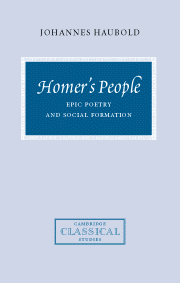
-
Select format
-
- Publisher:
- Cambridge University Press
- Publication date:
- June 2014
- April 2000
- ISBN:
- 9781107297975
- 9780521770095
- 9780521066419
- Dimensions:
- (216 x 138 mm)
- Weight & Pages:
- 0.48kg, 258 Pages
- Dimensions:
- (216 x 140 mm)
- Weight & Pages:
- 0.36kg, 260 Pages
- Series:
- Cambridge Classical Studies
Book description
This book examines the role and character of Homer's people, laoi, in Homeric story-telling, arguing that Homeric poetry is crucially concerned with the people as a basis for communal life. Both The Iliad and The Odyssey are read as sustained meditations on the processes involved in protecting and destroying the people. The investigation draws on a wide range of approaches from formulaic analysis to the study of early performance contexts. From a close reading of the Homeric epics, Homer's people emerge as a community without effective social structures. When this is viewed from the perspective of Homeric performances in the polis, a contrast between Homer's laoi and the founding people of ritual emerges. While the former typically perish, the survival of the latter is secured by the establishment of successful institutions.
Reviews
Review of the hardback:‘… a very good book that breaks much new ground.’
Source: Bryn Mawr Classical Review
Contents
Metrics
Full text views
Full text views help Loading metrics...
Loading metrics...
* Views captured on Cambridge Core between #date#. This data will be updated every 24 hours.
Usage data cannot currently be displayed.
Accessibility standard: Unknown
Why this information is here
This section outlines the accessibility features of this content - including support for screen readers, full keyboard navigation and high-contrast display options. This may not be relevant for you.
Accessibility Information
Accessibility compliance for the PDF of this book is currently unknown and may be updated in the future.


